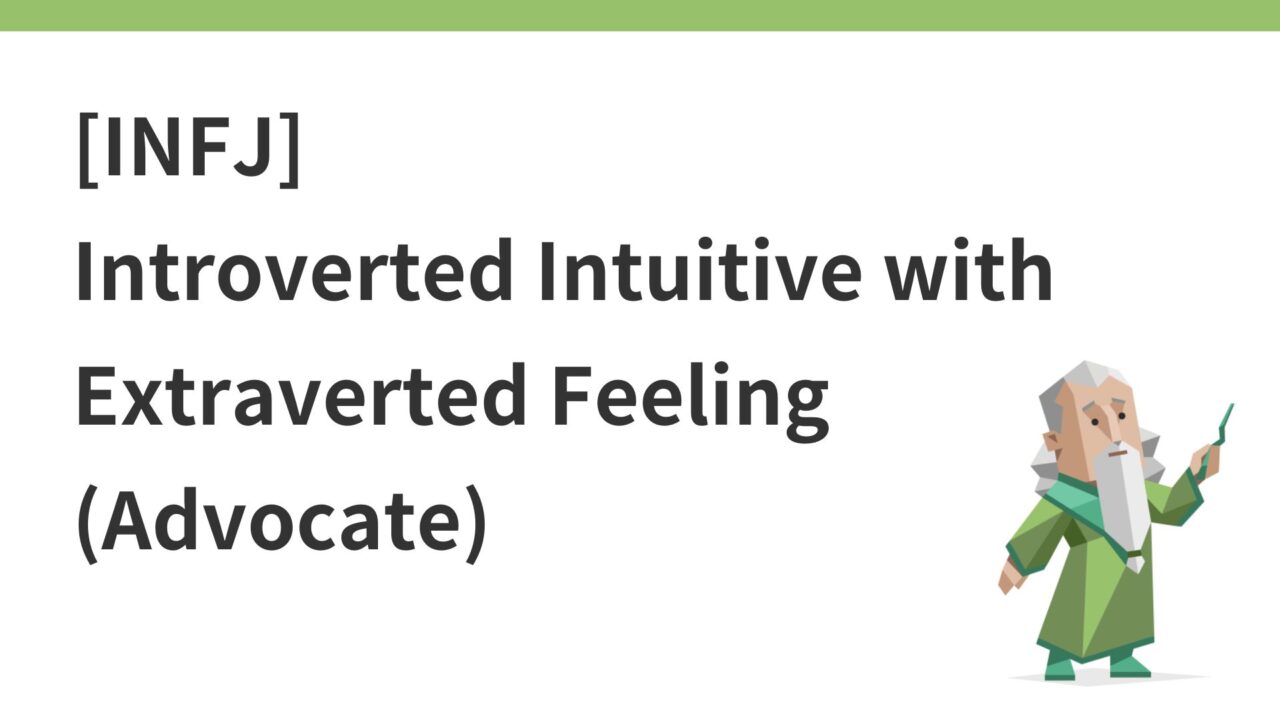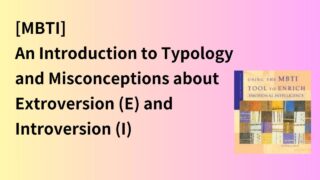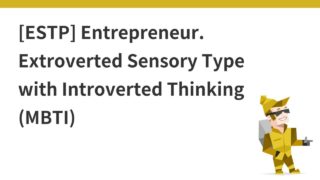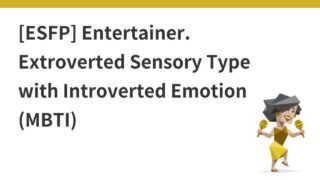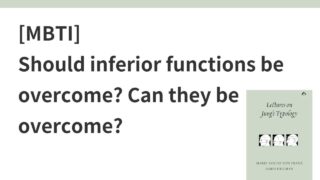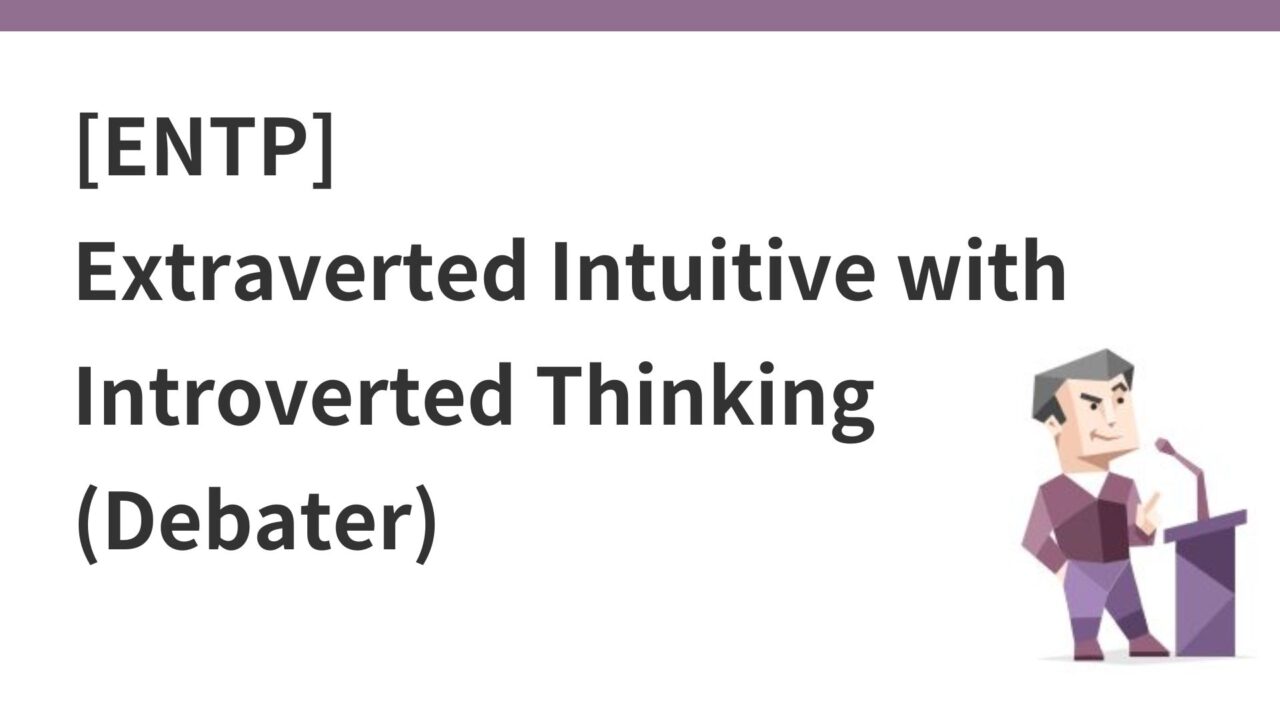- Introduction.
- Public’s impression of INFJs
- Ni-Fe: introverted intuition type with extroverted emotions
- Differences between INFJs and INTJs
- Impressions of INFJs on their surroundings
- Why are INFJs so sick? The Gap Between Ideal and Reality and Empathy Fatigue
- To strengthen the extroverted sense of inferior function (Se)
- Communication Characteristics: Good listener
- Reactions during stress and points for improvement
Introduction.
I will summarize the following perspectives on each MBTI personality type.
- Characteristics of the primary and auxiliary functions and the decision-making process
- Impression to the surroundings
- Inferior Functions and How to Enhance Inferior Functions
- Communication Features
- Reactions during stress and points for improvement
- Communication Styles and Points to Consider
This time, about INFJs.
Public’s impression of INFJs
If you Google INFJ, you will find related searches such as “INFJ hard to live,” “INFJ HSP hard,” “INFJ sickly,” “INFJ not open-minded,” “INFJ no friends,” and “INFJ door slam. The impression is that they seem hard to live with.
The “advocates” include Mother Teresa, Marie Kondo, Lady Gaga, and Dr. Martin Luther King, Jr.
Ni-Fe: introverted intuition type with extroverted emotions
INFJ cognitive functions in order of development are as follows
- Primary function (the function you are most aware of): introverted intuition (Ni)
- Auxiliary functions (functions that function well but are difficult to recognize in oneself): extraverted affect (Fe)
- Third function: introverted thinking (Ti)
- Inferior function: extroversion sensation (Se)
The following is a brief description of how each cognitive function affects an individual’s perception and behavior.
| cognitive function | Inward (i) | Outgoing (e) |
| Intuition (N) | Pattern recognition – inner insights and future predictions | Explore new possibilities – ideas and abstract concepts |
| Thinking (T) | Logical analysis – building internal theories and organizing thoughts | Objective judgment – decision-making for efficiency and fairness |
| Emotion (F) | Deep empathy – a deep understanding of personal feelings and values | Social harmony – forming emotional connections with others |
| Sensation (S) | Details of reality – reflection of inner concrete memories and experiences | Actual experience – direct interaction and action with the outside world |
INFJs use the process of judging things based on introverted intuition (Ni) with extroverted emotion (Fe).
Ni-Fe: Develop feasible plans by gaining insight into future possibilities and sharing them empathetically with others.
Introverted intuition (Ni): pattern recognition
Introverted intuition (Ni) helps INFJs have visions and deep insights into the future. Like an internal GPS for long-term forecasting and planning, Ni allows INFJs to articulate their long-term goals and ideals, and to internally map out a path to move toward them. They imagine possible future scenarios and decide what to do now based on them.
Extroverted emotion (Fe): social harmony
Extroverted Feeling (Fe) helps to share that vision with others and realize it through empathy; Fe is the ability to understand the feelings and needs of others and facilitate their actions in harmony. This ability allows INFJs to build strong trusting relationships with others and gain cooperation through empathy.
Differences between INFJs and INTJs
Both INFJs and INTJs have introverted intuition (Ni) as their primary function and are good at having visions of the future and deep insights, but their auxiliary functions are different, leading to differences in their thinking and behavioral styles.
INFJs use extraverted affect (Fe) to establish emotional connections with others, while INTJs use extraverted thinking (Te) to plan efficiently and practically; INFJs are sensitive to the feelings and needs of others and emphasize harmony, while INTJs act logically and strategically to achieve their goals; INTJs are less involved in or influenced by the feelings and needs of others to achieve their goals than INFJs.
Impressions of INFJs on their surroundings
With the above major cognitive functions of introverted intuition (Ni) and extroverted effect (Fe), INFJs are prone to the following general impressions.
- Sharp insight: INFJs have an intuitive ability to capture complex patterns and meanings and have deep insights into future possibilities. Often, they spot minute nuances and trends that others might miss. They take a long-term view and have a clear vision of the future.
- Empathic and Compassionate: INFJs are very sensitive to the feelings and needs of others and are highly empathetic and supportive. They are good at understanding the feelings of others and responding appropriately.
- Idealist: INFJs have high ideals and are willing to work toward them. They are true to their values and beliefs and act on this basis. They have a strong interest in the betterment of society and the growth of others and make concrete plans to realize their ideals.
- Cautious and introspective: INFJs are introverted and tend to delve deeply into their own thoughts and feelings. This is reflected in their interactions with others and allows them to be cautious and thoughtful; INFJs are good at analyzing emotions and experiences in detail and gaining insights for personal growth.
- Quiet Leadership: INFJs are calm and unassuming, yet influential and capable of leading people. They do not force leadership, but naturally draw people to them through empathy and understanding; INFJs share a vision and encourage others to willingly collaborate. Their leadership is based on trust and respect and often produces long-term results.
Why are INFJs so sick? The Gap Between Ideal and Reality and Empathy Fatigue
When searching for INFJs, words such as “hard to live, sickly, and open-minded” come up, which is a combination of INFJ’s unique introverted intuition (Ni) and extroverted emotions (Fe).
In order to realize one’s high ideals based on introverted intuition (Ni), one tries to cooperate with others while empathizing with them (Fe), but of course, others have various motivations and personality types, so things may not actually go according to one’s ideals, and one may suffer from a gap between ideals and reality. It is easy to suffer from the gap between the ideal and the reality. In addition, they are easily afflicted by the double punch of empathy fatigue from such other people.
In an unhealthy Ni-Fe loop, one’s ideals are unrealizable, and even if one’s surroundings look at one strangely, one’s Ni theory and vision are firm and cannot be bent, so one becomes ill, thinking that “the surroundings are wrong and I must do something to make them understand. The ultimate in unhealthiness is Yagami Tsuki.
On the other hand, INTJs take an efficient and logical approach using extroverted thinking (Te) and are less influenced by the emotions of others, so even if they have the same high ideals, they have less mental strain and less sickness in terms of empathy fatigue. Also, since they don’t look to others for their pet theory/vision by Ni like the INFJ’s auxiliary function of Fe, they tend to be self-contained, logically assembling information from the outside world.
INFJs are also introverted and cautious about disclosing their feelings and thoughts to others; Ni allows them to deeply introspect on past experiences and Fe allows them to seek emotional connections with others, but past hurtful experiences make them hesitant to open up again (hence the INFJ door slam). Because they seek deeper bonds than superficial relationships, they tend to have fewer friends. Because of the small percentage of INFJs to begin with, combined with Ni-Fe, they tend to focus on psychology and emotions, so they tend to gravitate toward MBTI, psychology, and philosophy, and I think the largest number of MBTI-related articles I’ve written in NOTE is on INFJs.
Personally, I think that if INFJs have difficulty living in the real world, they should nourish their minds by reading explanatory articles and videos about INFJs on NOTE and YouTube, or by reading books (especially works that deeply depict human psychology) and immersing themselves in the inner world.
To strengthen the extroverted sense of inferior function (Se)
The inferior function, extroversion (Se), is relatively the least developed.
Extroversion (Se) is the ability to pay attention to the present moment and capture tangible information through the five senses; people with strong Se are good at reacting quickly to and enjoying real environments and events. They enjoy the here and now.
Participate in physical activities
Participating in physical activities such as running, yoga, dancing, cycling, etc. can help you focus on real-life experiences through your senses. Go to the gym every week to take a new fitness class, or go on a weekend hike with a friend.
Get in touch with nature
Through activities in nature such as hiking, camping, gardening, etc., one can stimulate the senses and focus on the present moment.
Incidentally, the types with the most developed of these extroverted senses (Se) are ESTPs and ESFPs, who are very sensitive to real, concrete information and sensory experiences, and are more focused on living in the present moment, or rather, can do so naturally.
What we need to learn to respect different types
For INFJs, who have difficulty enjoying the here and now while empathizing and touching others and thinking about a different future in their minds, the realistic perspective and enjoyment attitude of ESTPs and ESFPs may be helpful in finding a balance and may be helpful in many ways.
INFJs need to learn to respect different types, that begging for more other ideas can actually help, that actually doing is as valuable as contemplating.
Communication Characteristics: Good listener
- Emphasis on harmony: Tend to value harmony in relationships and avoid conflict. To avoid conflict, they use soft and polite language.
- Good listener: INFJs have excellent listening skills listen intently to others and strive to understand what they hear. They are good at creating an atmosphere in which others feel comfortable talking.
- Introverted and cautious: Because of his introverted nature, he expresses his feelings and thoughts cautiously. He discloses to people he trusts but is reserved with people he has never met or with whom he has a shallow relationship.
- Introspective Insight: INFJs share insights gained through self-reflection. They often discuss deep thinking and philosophical topics, preferring deeper content to superficial conversation.
Reactions during stress and points for improvement
When INFJs are exposed to stress, their primary function, introverted intuition (Ni), may be over-expressed, or extroverted sensations (Se), which are usually underused, may surface, causing a series of typical reactions.
Reactions under stress
- Excessive introspection: Excessive introspection can lead to excessive reflection on past failures and negative events, resulting in self-blame and low self-esteem.
- Emotional outbursts: When Fe is in overdrive, normally suppressed emotions may erupt all at once, causing one to lose control of emotions such as anger or sadness.
- Impulsive Behavior: When Se of poor functioning is manifested in an unhealthy manner, impulsive behavior may occur. They tend to engage in momentary pleasurable, reality-escaping behaviors to escape stress, such as overeating, excessive shopping, and risky behavior.
Key Points for Improvement
- Focus on reality: Practice mindfulness and meditation to bring attention to the present moment. Using the five senses to sense reality can help curb excessive future orientation.
- BOUNDARY SETTING: Set healthy boundaries in your relationships with others to prevent excessive self-sacrifice. Practice saying “no” when necessary. Process emotions regularly and healthily by talking to someone you trust before an emotional outburst.
- Conscious choice during impulses: before taking an impulsive action, stop and consider the consequences of your choice. When you feel an impulse, try to engage in a healthy activity instead (exercise, walking, creative activity, etc.).
